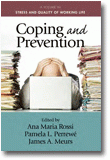
Coping and Prevention
Edited by:
Ana Maria Rossi, International Stress Management Association
Pamela L. Perrewé, Florida State University
James A. Meurs, University of Mississippi
A volume in the series: Stress and Quality of Working Life. Editor(s): Ana Maria Rossi, International Stress Management Association. Charn P. McAllister, Northern Arizona University. Jeremy D. Mackey, Auburn University.
Published 2012
Continuous activity and high job demands surround corporate environments. These demands are considered to be key triggers for workers’ stress-related symptoms and poor health. It has been estimated by the American Institute of Stress (AIS) that US$ 300 billion/year are spent on conditions related to excessive stress levels. Of course, occupational stressors are an unavoidable part of working life. Experienced stress has helped us to survive for thousands of years and keeps us vigilant under critical situations. Of course, too much experienced stress can lead to serious psychological and physical health problems. This book is devoted to examining important issues related to coping with and preventing elevated occupational stress. This book also examines individual differences and organizational cultures that might exacerbate or mitigate experienced stress.
If we consider all choices available, it is better to prevent than to treat. Prevention can be primary, when we prevent the stress-generating situation from occurring; secondary, when we provide alternatives to minimize the damage caused by the problem and tertiary, which involves containing losses that have occurred to prevent them from becoming more serious. This book on stress prevention and coping with stress is intended to assist occupational health professionals and academics to improve their abilities to help employees managing stress, but it also can be helpful for individual workers as they learn to better handle stressors at work. The research findings and views presented by these well-respected leaders in stress research provide tools for those currently experiencing workplace stress and supplies information concerning how stress can be prevented before it occurs.
CONTENTS
Foreword. Preface. SECTION I: THE ROLE OF THE INDIVIDUAL IN OCCUPATIONAL STRESS. Interpersonal Conflict and Stress at Work: Implications for Employee Health and Well-Being, Valentina Bruk-Lee and Paul E. Spector. Organizational Identity, Social Support Systems, and Occupational Stress: The Development of a Conceptual Model, Jason Stoner and Pamela L. Perrewé. The Relationship between Stress, Alcohol Use, and Work, Edilaine C. Silva Gherardi-Donato, Margarita Antonia Villar Luis, and Clarissa Mendonça Corradi-Webster. Age-Related Trends in Workers’ Subjective Well-Being and Perceived Job Quality, Jessica M. Streit, Steven L. Sauter, and Dennis J. Hanseman. SECTION II: EXAMINING IMBALANCE AND MISMATCH MODELS OF STRESS. Social Reward and Health: How to Reduce Stress at Work and Beyond, Johannes Siegrist. That Wasn’t Too Stressful, or Was It: Physiological Stress Responses to Regulatory Focus (Mis)Match, Chad Ian Peddie, Julie A. Agar, Kate A. LaPort, and Lois E. Tetrick. SECTION III: THE ROLE OF THE ORGANIZATION AND QUALITY OF WORK LIFE IN STRESS. The Relationship between Family-Supportive Culture, Work–Family Conflict, and Emotional Exhaustion: A Multilevel Study, Kristi Zimmerman, Leslie Hammer, and Tori Crain. Stress Management and Occupational Quality of Life Programs in Public Security, Tatiana Severino de Vasconcelos. Quality of Life and Burnout in Physicians, Avelino Luiz Rodrigues, Elisa Maria Parahyba Campos, and Guilherme Borges Valente. Healthy Possibilities to Face a Hypermodern Life: Facets of Constructive Leisure, Ieda Rhoden. Women in Modern Times with Quality of Life, Elizabeth P. Mendes Ribeiro and Sérgio Rocha. SECTION IV: EXAMINING THE BIGGER PICTURE OF OCCUPATIONAL HEALTH AND WELL BEING. ”Not So Fast, My Friend!”: The Eternal Marital Bliss or Imminent Divorce of Leadership and Neuroscience, Thomas A. Zeni, M. Ronald Buckley, Anthony C. Klotz, and Milorad M. Novicevic. People Management: A Psychosomatic View and Commentary, Artur Zular. Occupational Stress: Causes, Consequences, Prevention and Intervention, Joseph J. Hurrell Jr. and Steven L. Sauter. About the Contributing Authors.
-
Paperback978-1-61735-701-5
Web price: $45.04 (Reg. 52.99)
-
Hardcover978-1-61735-702-2
Web price: $80.74 (Reg. 94.99)
- eBook978-1-61735-703-9

- SEL024000 - SELF HELP: Stress Management
- PSY021000 - PSYCHOLOGY: Industrial & Organizational Psychology
- SEL027000 - SELF HELP: PERSONAL GROWTH: Success
-
 Improving Employee Health and Well Being
Improving Employee Health and Well Being
-
 Stress and Quality of Working Life
Finding Meaning in Grief and Suffering
Stress and Quality of Working Life
Finding Meaning in Grief and Suffering
-
 Stress and Quality of Working Life
Coping at Work and at Home
Stress and Quality of Working Life
Coping at Work and at Home
-
 Stress and Quality of Working Life
Current Perspectives in Occupational Health
Stress and Quality of Working Life
Current Perspectives in Occupational Health
-
 Stress and Quality of Working Life
The Positive and The Negative
Stress and Quality of Working Life
The Positive and The Negative
-
 Stress and Quality of Working Life
Interpersonal and Occupation‐Based Stress
Stress and Quality of Working Life
Interpersonal and Occupation‐Based Stress
-
 Stress and Quality of Working Life
Conceptualizing and Assessing Stress
Stress and Quality of Working Life
Conceptualizing and Assessing Stress

